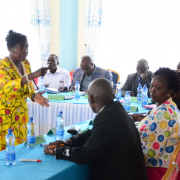By David Wandabi and Lynn Oburu – KOEE
Kamuthatha Primary Boarding School started in 1987. It was an initiative of the ACK Mothers Union of Nembure Parish. The school is located 25 kilometres from Embu town, 4 kilometres of Embu Meru Highway between Kithimu and Ena markets and next to ACK Kamuthatha All Saints Church in Embu County. The school lies on a 15 acre piece of land. It is three streamed, starting from class 5 to 8. Currently, it has 630 pupils, 21 teachers, and 20 non-teaching staff.
The school joined the Eco-schools Programme in 2017. The main problem faced by the school is inadequate water. Being a boarding school, the school needs a considerable amount of water for the pupils and farming. The school largely relies on one borehole for water which insufficient, especially during dry spells. Stretched dry spells lead to a significant decrease in their crop production on their farm as well as insufficient water for livestock.
The school has several exemplary innovative projects that have been started as a response to a number of challenges in an attempt to make the school self-sufficient. The school is an Eco school that takes its sustainability seriously. With a population of about 630 pupils, it has been able to provide for its students largely with resources from the local environment.
The school practices extensive rainwater harvesting using both underground and surface tanks. The school also recycles wastewater to supplement rainwater that is mainly used to irrigate crops, flowers, and trees. The school gets over 75% of its food from the school farm. They grow pineapples, bananas, tomatoes, coffee, kales, maize, sugarcane, tree tomatoes, pumpkins, and thorn melons. The farm produce is firstly sold to the school itself at a subsidized price. The surplus is sold to the local community. The employs complete organic agriculture with manure generated from livestock, kitchen and other organic wastes. The school also treats human waste to provide slurry used on the school farm.
Livestock keeping is quite remarkable in the school. They have an assortment of animals including 5 dairy cows, 5 beef cattle, pigs, goats and layers and broilers chicken. These provide milk, eggs, and meat for the school. The dairy cows produce up to 100 litres on a normal day and up to 200 litres per day when all cows are being milked. The school slaughters a bull for meat weekly. The animal feeds and fodder is mainly acquired from the school farm where they are grown.
Energy conservation is also a key project in the school. The school has a solar heating system to boil bathing water for the students. It has 5 solar water heating system for the boys and 3 for the girls. Each system has a capacity of heating 300 litres of water per day totaling to 2,400 litres heated in a day. The school is planning to start a biogas initiative as an alternative source of fuel in their cooking to reduce over-reliance on firewood. This is necessary since the school has its own bakery that provides bread for the students, teachers and non-teaching staff. The school has a woodlot that provides firewood for cooking. Additionally, the school does extensive tree planting across its campus.
As central to the Eco-schools process, students are at the center of Kamuthatha Primary School’s sustainability activities. Students are actively involved in growing and watering crops and trees. The students also take part in feeding the animals as well as cleaning their sheds. This is all geared towards imparting practical skills, values, and knowledge to the students as catalysts of green growth and sustainable development. One amazing initiative is how the school uses simple science experiment in preserving their grains in locally modified metallic silos. The school dries their grains which are then stored in the silos. To preserve the grains, candles are lit in the upper parts of the silos to draw out any oxygen to prevent any possible survival of any living organism that could otherwise lead to maize spoilage. Students are also exposed to a home-made wooden box to ripen bananas. The box is tightly sealed to help fruits ripen in time, generally within 2 days.
The school has sustainability at the center of their activities, a practice which the whole school subscribes to. In the words of the headteacher Mr. Francis Njue, “Nature is unforgiving, we destroy it slowly, but it destroys us at once.” He further emphasizes the need to equip students to issues of sustainability as early as possible if we want to cultivate a culture of sustainability in society.
Mr. Njue says, “Children are like seedlings and as we care for seedlings to become healthy and productive forests; we should groom children into the forests we want them to be.”



Leave a Reply
Want to join the discussion?Feel free to contribute!